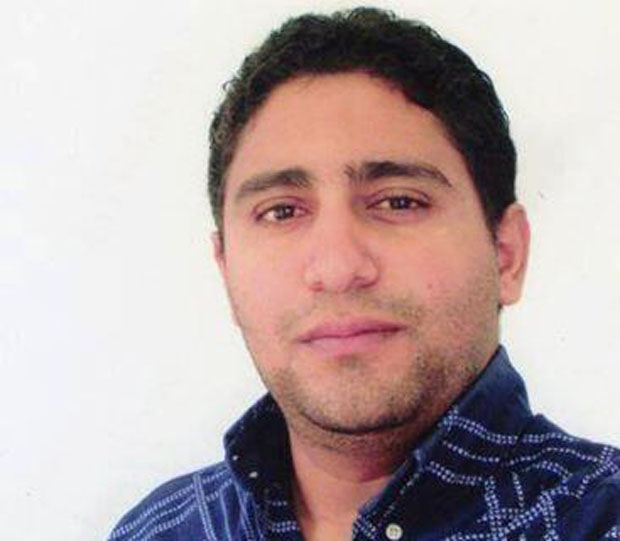28 Jan 2014 | News

Staff at Newtownabbey’s Theatre on the Mill return promotional posters to hoardings after the local council overturned a ban on the Reduced Shakespeare Company’s The Bible: The Complete Word of God (Abridged). Image Conor Macauley/Twitter
Councillors in Newtownabbey, Co Antrim, Northern Ireland last night voted to overturn a controversial ban on a Bible-based comedy in the town’s theatre. The town had hit international headlines last week after Christian councillors had sought to stop performances of the Reduced Shakespeare Company’s The Bible: The Complete Word of God (abridged).
The Newtownabbey Times reports that town councillors criticised pressure put on the town’s Artistic Council by some members of the Democratic Unionist Party, with one politician denouncing them as “continuity Paisleyites who want to take us back to the Dark Ages.”
The Democratic Unionist Party, which was founded by fundamentalist Christian preacher Ian Paisley, sought to distance itself from the original decision, though its members had been accused of being responsible for pressuring the artistic council into stopping the performances.
The performances will now go ahead on Wednesday and Thursday of this week, as originally scheduled.
This article was posted on 28 January 2014 at indexoncensorship.org
28 Jan 2014 | News, Politics and Society, Religion and Culture, Tunisia

The imprisonment of Jabeur Mejri over the publication of prophet Muhammad cartoons on his Facebook page is set to come to an end soon, reports Tunisian local media.
Mohamed Attia, vice-president of the Tunisian League for Human Rights (LTDH) told privately-owned radio station Shems FM that Mejri will soon be released, and that he will travel to Sweden where he has allegedly obtained political asylum. The announcement comes after civil society groups visited Mejri in prison on 21 January.
The initiative was led by the International Federation for Human Rights (FIDH) and included representatives from the LTDH, the Tunisian Forum for Socio Economic Rights (FTDES) and Mejri’s support committee.
Mejri has been in prison for nearly two years for posting cartoons of the Prophet Muhammad on his Facebook page. He was sentenced to a seven-and-a-half year jail term for “publishing material liable to cause harm to public order or good morals”, “insulting others through public communication networks” and “assaulting public morals”.
His friend Ghazi Beji, who received the same sentence in absentia after fleeing the country, obtained political asylum in France last year.
“I cannot enjoy my freedom in Tunisia. So, I have to leave my country,” Jabeur told Henda Chennaoui, a member of his support committee, during last week’s visit.
But in order to leave the country, Mejri must first obtain a presidential pardon. Despite Tunisian president Moncef Marzouki promising this on a number of occasions, he has so far not kept his pledge.
Meanwhile, Tunisia’s National Constituent Assembly (NCA) overwhelmingly approved a new constitution on Sunday. Though the charter enshrines freedom of expression, provisions that restrict free speech over religious issues have raised concerns.
Article 6, on freedoms of belief, conscience and religious practice, tasks the State with “protecting sanctities”. The article was expanded in early January to ban “Takfir” (apostasy accusations), at the request of opposition representatives in the NCA. The same article was further amended last week to prohibit the “undermining of sanctities”.
“The state sponsors religion, guarantees freedom of belief and conscience and religious practices, protects sanctities, and ensures the neutrality of mosques and places of worship away from partisan instrumentalisation. The state commits to spreading values of moderation and tolerance, and to protect the sacred and prevent its undermining. [The state] also commits to ban and fight accusations of apostasy (“takfir”) hate speech and incitement violence,” it states.
“Article 6 remains the shame of this constitution: a clear and definite restriction of free speech,” Amira Yahyaoui, president of human rights NGO Albawsala, tweeted on 23 January.
“There are several vague points that open the door to the return of censorship, especially with the establishment of the protection of the Sacred [notion],” Lotfi Azouz, director of the Tunis bureau of Amnesty International said at a press conference on Saturday. Free speech provisions in the constitution are “chained up by principles that could harm this freedom”. He further added that article 6 “establishes censorship in the name of protecting the sacred”.
28 Jan 2014 | China, News

(Photo illustration: Shutterstock)
Measures implemented by Chinese authorities in 2013 are “reminiscent of the Mao era four decades ago,” the International Federation of Journalists (IFJ) said in a statement accompanying the latest edition of their annual China Press Freedom report.
The press freedom organisation argues that “Chinese authorities continued to tighten their grip on information and media outlets” in 2013.
Among other things, the report — which four journalists from the region contributed to — states that new leader Xi Jiping “set out to strengthen the use of the media as a propaganda tool”. Journalists and bloggers were also forced to make “televised confessions” and “tens of thousands of online messages were deleted, and many websites were shut down”.
The situation for foreign media was also poor, with foreign journalists receiving death threats, and international websites being blocked.
The report also covered Hong Kong and Macau. Journalists in Hong Kong received “verbal and physical abuse” and there were attacks on, and threats to, media owner and outlets. Macau is experiencing “a growing trend to self-censorship”.
The IFJ made a number of recommendations, including calling on the Chinese government to release jailed journalists, stop “arbitrary and unexplained employment terminations” and “order and end to state security misusing the law to intimidate and silence journalists.”
“Press freedom is a human right and the media must be able to perform their professional duties without fear and intimidation,” the group said.
28 Jan 2014 | Azerbaijan, Azerbaijan News, News, Religion and Culture
Azerbaijani campaigners have called on their government to refrain from preventing public events amid claims the country’s authorities recently blocked the screening of a documentary on freedom of artistic expression.
“Art claims democracy” was set to run at the Park Inn Hotel, Baku, on January 24 as part of the Art for Democracy campaign; a suspicious power cut halted all activity.
The power outage was limited only to the second floor of the building, the floor on which the documentary film was to be aired. Organisers confronted hotel staff at the time who informed them of a technical problem. According to Art for Democracy some hotel employees later unofficially admitted the power shortage was a result of pressures on the hotel management.
A public statement was published by Art for Democracy in-light of the incident: “Prevention of the screening of a film, which features critical opinions about several top ranking officials including Azerbaijan’s President Ilham Aliyev, could have been organised by no one except law-enforcement agencies under the instructions of high-ranking officials. By taking this step, the government attempted to make the hotel, a private enterprise, and civil society representatives to confront each other.”
The campaign stated the Azerbaijani government needs to be weary of preventing such events and to respect human rights, emphasising how such restrictions only reflect badly the international image of the country.
This article was posted on 28 January 2014 at indexoncensorship.org



